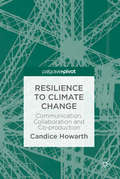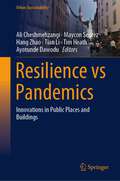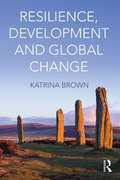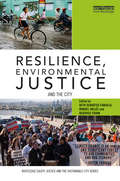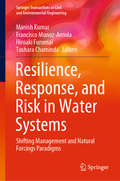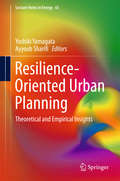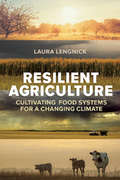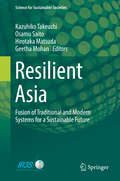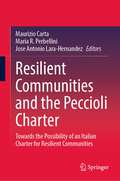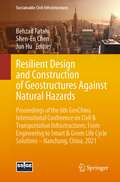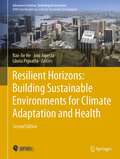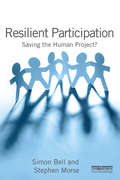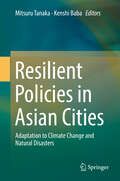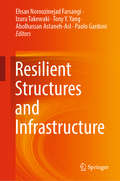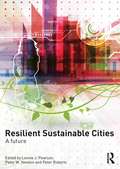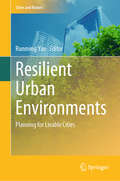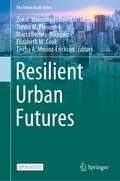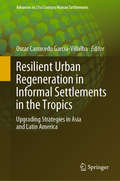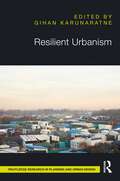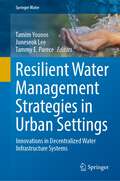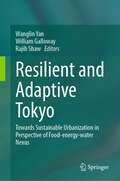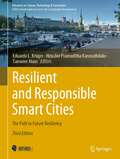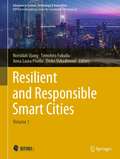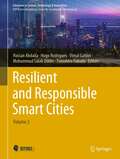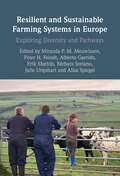- Table View
- List View
Resilience to Climate Change: Communication, Collaboration and Co-production
by Candice HowarthThe frequency and intensity of climate shocks such as heatwaves and flooding, are expected to increase under a changing climate with severe implications across the food, energy, water, environment nexus. This book critically explores how to improve resilience to climate shocks by examining the range of challenges and opportunities that exist in the aftermath of shocks and discusses factors that exacerbate and mitigate these. It innovatively discusses the importance of embedding communication, collaboration and co-production within resilience-building across sectors and stakeholders. Doing so with policy, practitioner and scientific communities, Candice Howarth argues, can pave the way to overcome challenges that emerge from climate shocks and facilitate the co-design of sustainable, robust and resilient responses.
Resilience vs Pandemics: Innovations in Public Places and Buildings (Urban Sustainability)
by Ali Cheshmehzangi Ayotunde Dawodu Tim Heath Hang Zhao Maycon Sedrez Tian Li“Resilience vs Pandemics: Innovations in Public Places and Buildings” explores innovative solutions for architecture and public places during and after the pandemic. Additionally, the authors contribute to the documentation of architectural and social transformations that have been prompted by previous transmissible diseases, as this knowledge can inform responses to future pandemics. In this volume, the chapters present critical, exploratory, multi- and interdisciplinary, and cutting-edge research approaches; with a particular focus on the effects of COVID-19 and other highly transmissible diseases on the design, use, performance, and perception of the built environment, particularly at the building scale. This volume aims to organize a collection of scientific studies, reviews, analysis, recommendations, and solutions in the fields of urban design, architecture, design, landscape design, etc. The overarching goal is to document new approaches to create and enhance built environment resilience. Chapters shed light on novel methods, tools, processes, regulations, behaviours, and other relevant details contributing to a comprehensive understanding of this crucial issue. The two scales of the built environment under consideration are: (1) Public Places, including research on transformations (death, emergencies, changes), requirements, adaptability, usability, virtual immersion, historical perspectives, interactivity, shifts in use and programs, etc.(2) Buildings, including regulations, shifts in use and program, non-pharmaceutical interventions, human interactions, and human-machine interfaces. The book covers a wide range of studies, including physical and non-physical studies, which may refer to the city infrastructure, green/blue spaces, housing, policy-making, health services, social and economic issues, etc. The findings and results of various global case study examples contribute to the decision-making of governments, organizations, and institutions, as well as inspire scholars and future research for developing resilience in the post-pandemic era.
Resilience, Development and Global Change
by Katrina BrownResilience is currently infusing policy debates and public discourses, widely promoted as a normative goal in fields as diverse as the economy, national security, personal development and well-being. Resilience thinking provides a framework for understanding dynamics of complex, inter-connected social, ecological and economic systems. The book critically analyzes the multiple meanings and applications of resilience ideas in contemporary society and to suggests where, how and why resilience might cause us to re-think global change and development, and how this new approach might be operationalized. The book shows how current policy discourses on resilience promote business-as-usual rather than radical responses to change. But it argues that resilience can help understand and respond to the challenges of the contemporary age. These challenges are characterized by high uncertainty; globalized and interconnected systems; increasing disparities and limited choices. Resilience thinking can overturn orthodox approaches to international development dominated by modernization, aid dependency and a focus on economic growth and to global environmental change – characterized by technocratic approaches, market environmentalism and commoditization of ecosystem services. Resilience, Development and Global Change presents a sophisticated, theoretically informed synthesis of resilience thinking across disciplines. It applies resilience ideas specifically to international development and relates resilience to core theories in development and shows how a radical, resilience-based approach to development might transform responses to climate change, to the dilemmas of managing forests and ecosystems, and to rural and urban poverty in the developing world. The book provides fresh perspectives for scholars of international development, environmental studies and geography and add new dimensions for those studying broader fields of ecology and society.
Resilience, Environmental Justice and the City (Routledge Equity, Justice and the Sustainable City series)
by Beth Schaefer Caniglia Manuel Vallee Beatrice FrankUrban centres are bastions of inequalities, where poverty, marginalization, segregation and health insecurity are magnified. Minorities and the poor – often residing in neighbourhoods characterized by degraded infrastructures, food and job insecurity, limited access to transport and health care, and other inadequate public services – are inherently vulnerable, especially at risk in times of shock or change as they lack the option to avoid, mitigate and adapt to threats. Offering both theoretical and practical approaches, this book proposes critical perspectives and an interdisciplinary lens on urban inequalities in light of individual, group, community and system vulnerabilities and resilience. Touching upon current research trends in food justice, environmental injustice through socio-spatial tactics and solution-based approaches towards urban community resilience, Resilience, Environmental Justice and the City promotes perspectives which transition away from the traditional discussions surrounding environmental justice and pinpoints the need to address urban social inequalities beyond the build environment, championing approaches that help embed social vulnerabilities and resilience in urban planning. With its methodological and dynamic approach to the intertwined nature of resilience and environmental justice in urban cities, this book will be of great interest to students, scholars and practitioners within urban studies, environmental management, environmental sociology and public administration.
Resilience, Response, and Risk in Water Systems: Shifting Management and Natural Forcings Paradigms (Springer Transactions in Civil and Environmental Engineering)
by Hiroaki Furumai Manish Kumar Francisco Munoz-Arriola Tushara ChamindaThis book talks about the dynamics of the surface water-groundwater contaminant interactions under different environmental conditions across the world. The contents of the book highlight trends of monitoring, prediction, awareness, learning, policy, and mitigation success. The book provides a description of the background processes and factors controlling resilience, risk, and response of water systems, contributing to the development of more efficient, sustainable technologies and management options. It integrates methodologies and techniques such as data science and engineering, remote sensing, modelling, analytics, synthesis and indices, disruptive innovations and their utilization in water management, policy making, and mitigation strategies. The book is intended to be a comprehensive reference for students, professionals, and researchers working on various aspects of science and technology development. It will also prove a useful resource for policy makers and implementation specialists.
Resilience-Oriented Urban Planning: Theoretical And Empirical Insights (Lecture Notes In Energy #65)
by Yoshiki Yamagata Ayyoob SharifiThis book explores key theoretical and empirical issues related to the development and implementation of planning strategies that can provide guidance on the transition to climate-compatible and low-carbon urban development. It especially focuses on integrating resilience thinking into the urban planning process, and explains how such an integration can contribute to reflecting the dynamic properties of cities and coping with the uncertainties inherent in future climate change projections.Some of the main questions addressed are: What are the innovative methods and processes needed to incorporate resilience thinking into urban planning? What are the characteristics of a resilient urban form and what are the challenges associated with integrating them into urban development? Also, how can the resilience of cities be measured and what are the main constituents of an urban resilience assessment framework? In addition to addressing these crucial questions, the book features several case studies from around the world, investigating methodologies, challenges, and opportunities for mainstreaming climate resilience in the theory and practice of urban planning. Featuring contributions by prominent researchers from around the world, the book offers a valuable resource for students, academics and practitioners alike.
Resilient Agriculture
by Laura LengnickClimate change presents an unprecedented challenge to the productivity and profitability of agriculture in North America. More variable weather, drought, and flooding create the most obvious damage, but hot summer nights, warmer winters, longer growing seasons, and other environmental changes have more subtle but far-reaching effects on plant and livestock growth and development.Resilient Agriculture recognizes the critical role that sustainable agriculture will play in the coming decades and beyond. The latest science on climate risk, resilience, and climate change adaptation is blended with the personal experience of farmers and ranchers to explore: The "strange changes" in weather recorded over the last decade The associated shifts in crop and livestock behavior The actions producers have taken to maintain productivity in a changing climateThe climate change challenge is real and it is here now. To enjoy the sustained production of food, fiber, and fuel well into the twenty-first century, we must begin now to make changes that will enhance the adaptive capacity and resilience of North American agriculture. The rich knowledge base presented in Resilient Agriculture is poised to serve as the cornerstone of an evolving, climate-ready food system.Laura Lengnick is a researcher, policymaker, activist, educator, and farmer whose work explores the community-enhancing potential of agriculture and food systems. She directs the academic program in sustainable agriculture at Warren Wilson College and was a lead author of the report Climate Change and Agriculture in the United States: Effects and Adaptation.
Resilient Asia: Fusion Of Traditional And Modern Systems For A Sustainable Future (Science For Sustainable Societies Ser.)
by Osamu Saito Kazuhiko Takeuchi Hirotaka Matsuda Geetha MohanThis book summarizes three years of extensive research conducted in Sri Lanka, Indonesia and Vietnam as part of the CECAR – Asia project, which was intended to enhance resilience to climate and ecosystem changes by developing mosaic systems to strengthen resilience of bio-production systems through the integration of large-scale modern agriculture systems with traditional, decentralized small-scale systems. The book starts with climate downscaling and impact assessment in rural Asia, and then explores various adaptation options and measures by utilizing modern science and traditional knowledge including home garden systems and ancient irrigation systems. The book subsequently examines the influence of climatic and ecological changes and the vulnerability of social economies from quantitative and qualitative standpoints, applying econometric and statistical models in agriculture communities of Asia to do so. The main goal of all chapters and case studies presented here is to identify the merits of applying organic methods to both commercial large-scale production and traditional production to strengthen social resilience and promote sustainable development. Especially at a time when modern agriculture systems are highly optimized but run the risk of failure due to changes in the climate and ecosystem, this book offers viable approaches to developing an integrated framework of modern and traditional systems to enhance productivity and total system resilience, as illustrated in various case studies.
Resilient Communities and the Peccioli Charter: Towards the Possibility of an Italian Charter for Resilient Communities
by Maurizio Carta Jose Antonio Lara-Hernandez Maria R. PerbelliniThis book explores urban resilience through significant, original and rigorous academic research, utilising the experiences of town planners, architects and decision makers to create a charter on resilient communities. The second part of the book presents mini-essays discussing the strategic points of the paper, and enabling more casual readers with the ability to access information on urban resilience. The book then explores urban resilience through the work and understanding of the institutions responsible for regulating the professions of urban planner, educators, professionals, and those involved in communication. Providing numerous illustrations and examples, Resilient Communities and the Peccioli Charter will be of interest to researchers, postgraduates, architects, urban designers and planners alike.
Resilient Design and Construction of Geostructures Against Natural Hazards: Proceedings of the 6th GeoChina International Conference on Civil & Transportation Infrastructures: From Engineering to Smart & Green Life Cycle Solutions -- Nanchang, China, 2021 (Sustainable Civil Infrastructures)
by Jun Hu Behzad Fatahi Shen-En ChenThis volume contains state of the engineering practice and recent research in the field of built infrastructure and natural hazards. It is expected that the book will help engineers and researchers to design and built resilient infrastructures in challenging conditions (e.g., earthquakes and climate change) while optimising the design and minimising the future maintenance cost. In particular new design and construction techniques with reference to major infrastructure projects such as tunneling and transport infrastructure are discussed.
Resilient Horizons: Building Sustainable Environments for Climate Adaptation and Health (Advances in Science, Technology & Innovation)
by Joni Jupesta Bao-Jie He Gloria PignattaThis book discusses the challenges related to climate change mitigation and adaptation. It adds valuable strategies and insights into the development of new practices solving the identified social and economic problems related to ecosystem deterioration and anticipating other disasters related to climate change. As the decarbonization of cities and communities became an issue of great interest to many researchers, the book in hand is of great importance to decision-makers and energy stakeholders and others seeking a more resilient and sustainable future and developing innovative technologies to overcome environmental deterioration. This book is a culmination of selected research papers from the first version of the international conference on ‘Climate Change and Environmental Sustainability’ which was held in 2022 in collaboration with Chongqing University, China.
Resilient Participation: Saving the Human Project?
by Stephen Morse Simon BellStakeholder or public participation has become something of a modern mantra employed in all sorts of contexts to give people a voice. There are many variants on this 'participation' but traditionally they all share a desire to maximise involvement and provide desired 'outputs' of a required quality as quickly and as cheaply as possible. Difference tends to be reduced and compromise encouraged as the outputs or even just the appearance of participation are emphasised. This book explores the large and diverse range of participatory methods currently in use, examines the problems and gaps in these methods and sets out an innovative new methodology which overcomes these shortcomings. Uniquely, this method builds from the assumption that it is not just the outputs that matter in participation - it is also the journey. 'Triple Task' is designed to help groups explore their current situation and develop a path by which they can improve their functioning and ultimately make a positive contribution to the lives of others. The book includes in-depth case studies of Triple Task in action across a range of contexts and countries, with particular focus on an EU project concerning indicators in policy-making. This new approach can be used in any context and with any sort of group to help them produce more informative 'outputs' in which a deep reflection of how the group works is allied to an analysis of how problems can be solved.
Resilient Policies in Asian Cities: Adaptation to Climate Change and Natural Disasters
by Mitsuru Tanaka Kenshi BabaThis book presents a comprehensive framework and indicators that can be used to assess a city’s degree of resilience. Based on surveys using bottom-up assessment tools, it proposes the concept, framework and indicators of a resilient policy model (including some participatory approaches). It also presents case studies of this and similar tools applied to Japanese and Asian cities, the highlights including information not previously available in English. Today, the term “resilience” is prevalent in the context of sustainable societies. The IPCC AR5 published in 2014 again stressed the impact of climate change on natural disasters, while in March 2015 at the World Conference on Disaster Risk Reduction, the United Nations International Strategy of Disaster Reduction (UNISDR) published the Sendai Framework for Disaster Risk Reduction Action 2015-2030 , which serves as a guideline for local governments. Offering transdisciplinary perspectives from fields such as policy science, urban planning, environmental science, social psychology, management development and geography, this book discusses the lessons learned from Asian case studies, explaining the challenges and the effectiveness of the tools, and offering transdisciplinary insights for policymakers.
Resilient Structures and Infrastructure
by Izuru Takewaki Paolo Gardoni Ehsan Noroozinejad Farsangi Tony Y. Yang Abolhassan Astaneh-AslThis book discusses resilience in terms of structures’ and infrastructures’ responses to extreme loading conditions. These include static and dynamic loads such as those generated by blasts, terrorist attacks, seismic events, impact loadings, progressive collapse, floods and wind. In the last decade, the concept of resilience and resilient-based structures has increasingly gained in interest among engineers and scientists. Resilience describes a given structure’s ability to withstand sudden shocks. In other words, it can be measured by the magnitude of shock that a system can tolerate. This book offers a valuable resource for the development of new engineering practices, codes and regulations, public policy, and investigation reports on resilience, and provides broad and integrated coverage of the effects of dynamic loadings, and of the modeling techniques used to compute the structural response to these loadings.
Resilient Sustainable Cities: A Future
by Peter Roberts Leonie J. Pearson Peter W. NewtonUrbanization is occurring at an unprecedented rate; by 2050 three quarters of the world’s people will live in urban environments. The cars we drive, products we consume, houses we live in and technology we use will all determine how sustainable our cities will be. Bridging the increasing divide between cross-disciplinary academic insights and the latest practical innovations, Resilient Sustainable Cities provides an integrated approach for long term future planning within the context of the city as a whole system. In the next 30 years cities will face their biggest challenges yet, as a result of long term, or ‘slow burn’ issues: population growth will stretch to the breaking point urban infrastructure and service capacity; resource scarcity, such as peak oil; potable water and food security, will dramatically change what we consume and how; environmental pressures will change how we live and where and; shifting demographic preferences will exacerbate urban pressures. Cities can’t keep doing what they’ve always done and cope – we need to change current urban development to achieve resilient, sustainable cities. Resilient Sustainable Cities provides practical and conceptual insights for practitioners, researchers and students on how to deliver cities which are resilient to ‘slow burn’ issues and achieve sustainability. The book is organized around three overarching themes: pathways to the future innovation to deliver the future leadership and governance issues The book includes a variety of perspectives conveyed through international case studies and examples of cities that have transformed for a sustainable future, exploring their successes and failures to ensure that readers are left with ideas on how to turn their city into a resilient sustainable city for the future.
Resilient Urban Environments: Planning for Livable Cities (Cities and Nature)
by Runming YaoThis book aims to provide evidence of the impact of climate change and urbanization on cities’ urban environments thus on human health and wellbeing; and principles and methods for the improvement of the resilience of a city to extreme weather and long-term climatic changes through case studies. The book will have three themes of 1) Understanding the adverse environmental impact on human health and wellbeing; 2) analysis of adaptation and mitigation measures through modeling technologies; 3) providing best practice examples of the implementation of the proposed measures. The book will present the liveable cities including factors affecting liveability; ecological and biophilic city; economic values; health and well-being and opportunities for people. Physical and social health will be an important issue in the context of resilient cities. The widespread concerns will be addressed including physical and mental health; wellbeing in terms of building use;building surroundings and Biophilia; location in the context of sustainability and work-life balance; and spatial scale and community.
Resilient Urban Futures (The Urban Book Series)
by Timon McPhearson Marta Berbés-Blázquez Zoé A. Hamstead David M. Iwaniec Elizabeth M. Cook Tischa A. Muñoz-EricksonThis open access book addresses the way in which urban and urbanizing regions profoundly impact and are impacted by climate change. The editors and authors show why cities must wage simultaneous battles to curb global climate change trends while adapting and transforming to address local climate impacts. This book addresses how cities develop anticipatory and long-range planning capacities for more resilient futures, earnest collaboration across disciplines, and radical reconfigurations of the power regimes that have institutionalized the disenfranchisement of minority groups. Although planning processes consider visions for the future, the editors highlight a more ambitious long-term positive visioning approach that accounts for unpredictability, system dynamics and equity in decision-making. This volume brings the science of urban transformation together with practices of professionals who govern and manage our social, ecological and technological systems to design processes by which cities may achieve resilient urban futures in the face of climate change.
Resilient Urban Regeneration in Informal Settlements in the Tropics: Upgrading Strategies in Asia and Latin America (Advances in 21st Century Human Settlements)
by Oscar Carracedo García-VillalbaThis book focuses on the implementation of slum upgrading projects and the last generation of citywide programmes that define the future urban configuration of informal settlements, from a citywide perspective, in the Earth’s tropical region. The book presents a study on regeneration experiences in Asia and Latin America and it identifies important points of connection and similarities between the two cases, while also determining that, compared to Asia, informality in Latin America is in its ‘second generation.’
Resilient Urbanism (Routledge Research in Planning and Urban Design)
by Gihan KarunaratneAs urban populations grow unprecedentedly, cities worldwide face pressures from rapid expansion, climate change, and social inequalities. Resilient Urbanism critically examines how cities, towns, and informal settlements adapt to these multifaceted challenges, exploring urban resilience in the 21st century.This volume investigates resilience across a variety of urban contexts, from megacities in the Global South to suburban and coastal regions, through interdisciplinary essays. The contributors examine how urban communities confront crises, navigate urbanization, adapt to climate change, and respond to socioeconomic transformations using innovative and, at times, unconventional strategies. Case studies highlight the lived experiences of urban dwellers, from informal settlements in Maputo, Rio de Janeiro, and Hanoi to the challenges of achieving energy efficiency in Buenos Aires.By interrogating dominant discourses on urban resilience, Resilient Urbanism offers a reimagined perspective on how cities and their inhabitants address uncertainty and change. It emphasizes the everyday practices of urban residents and explores the sociopolitical dynamics of urbanization, presenting resilience not merely as a theoretical framework but as a lived, evolving process. This work sheds light on how cities withstand crises and actively reshape themselves in response to these disruptions.This volume is an essential resource for scholars, urban planners, policymakers, and professionals concerned with the future of cities. It underscores that urban resilience is not just a theoretical concept but a vital imperative for navigating the complexities of a rapidly changing global landscape.
Resilient Water Management Strategies in Urban Settings: Innovations in Decentralized Water Infrastructure Systems (Springer Water)
by Tamim Younos Tammy E. Parece Juneseok LeeThis book documents innovative approaches for integrating green technologies and decentralized water infrastructure. The two major components of green decentralized water infrastructure are: (1) using locally available alternative water sources (rainwater, greywater, and brackish/saltwater) (at multiple scales, e.g., a single building to a neighborhood community level); and (2) using renewable energy resources (solar, wind, biomass, geothermal, other). Chapter 1, introduces the concept and framework of green decentralized water infrastructure. The subsequent nine chapters give a detailed description of global case studies, and discuss significant components of the green decentralized water infrastructure and the challenges. The chapters document global case studies and prospects (chapters 1-7) followed by challenges facing decentralized water infrastructure (chapters 8-10). The book will provide a cross-disciplinary knowledge-base for smart & futuristic water management in urban settings and a significant opportunity for sharing smart and decentralized water technologies at the global level
Resilient and Adaptive Tokyo: Towards Sustainable Urbanization in Perspective of Food-energy-water Nexus
by Rajib Shaw Wanglin Yan William GallowayOur cities, and the systems that support them, have not been designed to address the FWE nexus. There exist gaps in awareness of the role and impacts of climate change. Improving communication among stakeholders with the support of scientific evidence is the key to narrowing the gaps. This book approached this issue with a multidisciplinary and transdisciplinary moveable nexus approach through the lens of FEW nexus under the project of the Sustainable Urbanization Global Initiative of Belmont Forum. It presents a collection of evidence/science-based planning decisions and participatory practices by using Tokyo as the focal area. It visualizes the stock and flow of the Food-Water-Energy (FEW) supporting the world’s largest metropolitan area, explores how the actors have worked together to secure the resilience and sustainability of resources, and demonstrates the potential of resources in making the city adaptive to climatic and social changes. It is designed for researchers in urbanization, nexus research, urban design research, environment, disaster risk reduction, and climate change studies, and can be used as a textbook for university courses. It is also a useful tool for practitioners and policymakers in applying collective knowledge to policy and decision-making.
Resilient and Responsible Smart Cities: The Path to Future Resiliency (Advances in Science, Technology & Innovation)
by Eduardo L. Krüger Tanweer Alam Hirushie Pramuditha KarunathilakeThis book is a compilation of diverse, yet homogenic, research papers that discuss current advances in Earth Observation and Geospatial Information Technologies to tackle new horizons concerning the digitization and information management in smart cities’ infrastructures. The book also tackles the challenges faced by urban planners by the new mega-cities and proposes a series of solutions to resolve complex urban issues. It suggests enhancing the integration of disciplines, thus, bringing together architects, urban planners, civil engineers, landscape designers and computer scientists to address the problems that our cities are facing. This book is a culmination of selected research papers from IEREK’s fourth edition of the International Conference on Future Smart Cities (FSC) and the fourth edition of the International Conference on Resilient and Responsible Architecture and Urbanism (RRAU) held online in collaboration with the XMUM, Selangor, Malaysia (2021).
Resilient and Responsible Smart Cities: Volume 1 (Advances in Science, Technology & Innovation)
by Norsidah Ujang Tomohiro Fukuda Anna Laura Pisello Dinko VukadinovićThis book focuses on the ways in which resiliency can foster the transformation of cities. There is a growing need for our cities to be transformed into “smart” cities; in this regard, tremendous efforts are called for in order to face the environmental challenges that play a major role in the creation or transformation of cities and environments. This book covers a broad range of applications and approaches that are “smart” and “resilient,” which, when combined, offer much more flexibility concerning the future of our cities. Consequently, this simple combination, which is producing sweeping changes around the globe, has attracted considerable attention from scholars and decision-makers alike.
Resilient and Responsible Smart Cities: Volume 2 (Advances in Science, Technology & Innovation)
by Hugo Rodrigues Hassan Abdalla Tomohiro Fukuda Vimal Gahlot Mohammad Salah UddinThis book aims to establish a community with attention to land use to achieve sustainable development and meet the needs of today’s society. Urban planning depends on engineering, architectural, social and political pillars. It pursues this by proposing solutions, regulating environmental pollution and non-sustainable use of available resources. It showcases and even triggers further debate about connections between sustainable development, urban planning and technology in hopes of achieving sustainable development models that sustain urban expansion and shape cities that improve the overall quality of life. It views urban planning and development as vital fields that ensure the application of revolutionary approaches with new materials and processes incorporated in the most efficient manner.
Resilient and Sustainable Farming Systems in Europe: Exploring Diversity and Pathways
by Alberto Garrido Julie Urquhart Peter H. Feindt Erik Mathijs Meuwissen, Miranda P. M. Bárbara Soriano Alisa SpiegelWhat exactly is resilience and how can it be enhanced? Farming systems in Europe are rapidly evolving while at the same time being under threat, as seen by the disappearance of dozens of farms every day. Farming systems must become more resilient in response to growing economic, environmental, institutional, and social challenges facing Europe's agriculture. Since the COVID-19 pandemic, the need for enhanced resilience has become even more apparent and continues to be an overarching guiding principle of EU policy making. Resilience challenges and strategies are framed within four main processes affecting decision making in agriculture: risk management, farm demographics, governance and agricultural practices. This empirical focus looks at very diverse contexts, with eleven case studies from Belgium, Bulgaria, France, Germany, Great Britain, Italy, Netherlands, Poland, Romania, Spain and Sweden. This study will help determine the future and sustainability of European farming systems. This title is available as Open Access on Cambridge Core.
